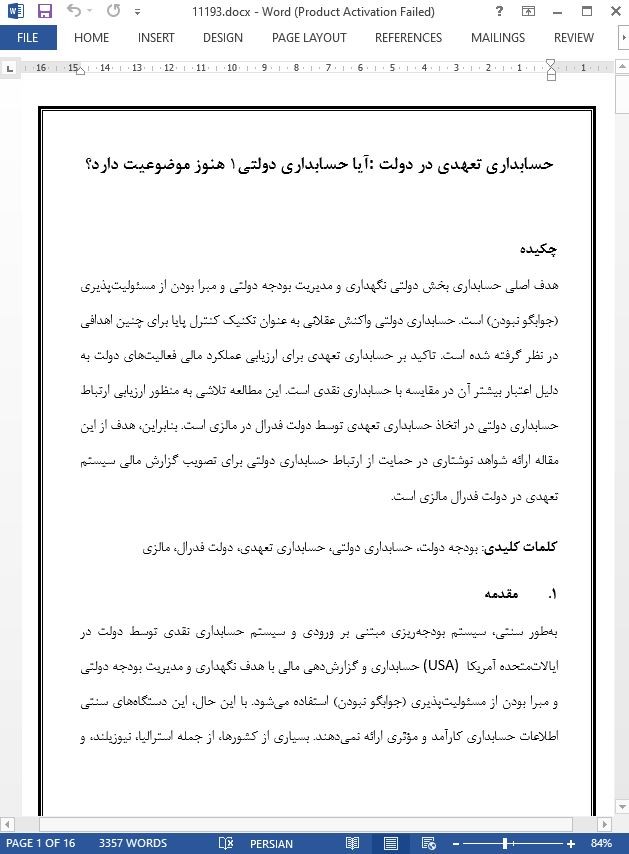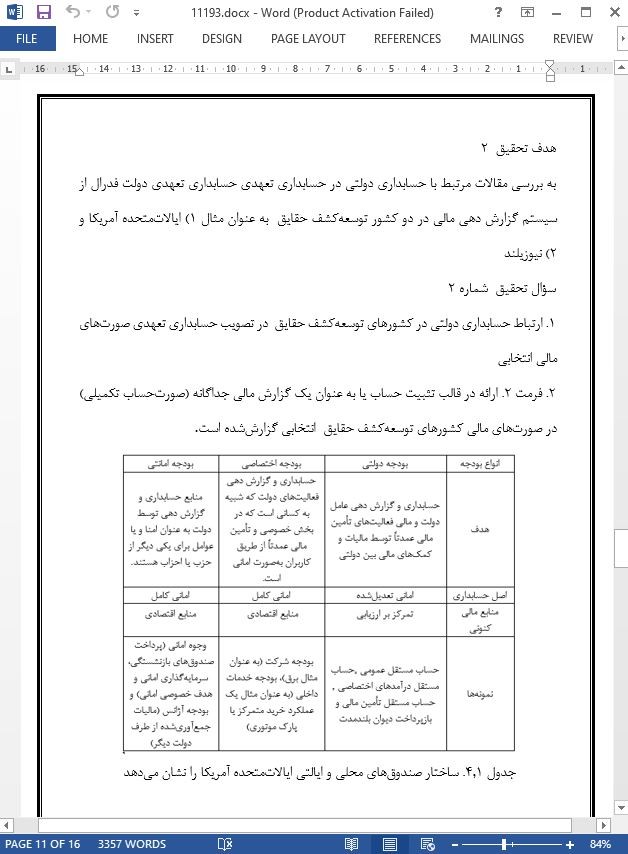
حسابداری تعهدی در دولت: آیا حسابداری دولتی هنوز موضوعیت دارد؟
چکیده
هدف اصلی حسابداری بخش دولتی نگهداری و مدیریت بودجه دولتی و مبرا بودن از مسئولیتپذیری (جوابگو نبودن) است. حسابداری دولتی واکنش عقلانی به عنوان تکنیک کنترل پایا برای چنین اهدافی در نظر گرفته شده است. تاکید بر حسابداری تعهدی برای ارزیابی عملکرد مالی فعالیتهای دولت به دلیل اعتبار بیشتر آن در مقایسه با حسابداری نقدی است. این مطالعه تلاشی به منظور ارزیابی ارتباط حسابداری دولتی در اتخاذ حسابداری تعهدی توسط دولت فدرال در مالزی است. بنابراین، هدف از این مقاله ارائه شواهد نوشتاری در حمایت از ارتباط حسابداری دولتی برای تصویب گزارش مالی سیستم تعهدی در دولت فدرال مالزی است.
1. مقدمه
بهطور سنتی، سیستم بودجهریزی مبتنی بر ورودی و سیستم حسابداری نقدی توسط دولت در ایالاتمتحده آمریکا (USA) حسابداری و گزارش¬دهی مالی با هدف نگهداری و مدیریت بودجه دولتی و مبرا بودن از مسئولیتپذیری (جوابگو نبودن) استفاده میشود. با این حال، این دستگاههای سنتی اطلاعات حسابداری کارآمد و مؤثری ارائه نمی¬دهند. بسیاری از کشورها، از جمله استرالیا، نیوزیلند، و انگلستان در حال حاضر از سیستم بودجهریزی مبتنی بر ورودی به سیستم بودجهریزی مبتنی بر نتیجه و از حسابداری بر مبنای نقدی به نوعی سیستم حسابداری تعهدی استفاده میکنند.
6. نتیجهگیری
مدل جدید اقتصادی مالزی (NEM) تصویب حسابداری تعهدی برای مدیریت مالی و اجرای ارزیابی بخش دولتی توصیهشده است. با تصویب برنامه حسابداری تعهدی دولت فدرال در سال 2015 مالزی، امید است که کشف حقايق این مطالعه بتواند کمکی به AGD در راستای بررسی ارتباط مفهوم فرایند تحول حسابداری دولتی در جهت حسابداری تعهدی دولت و گزارش دهی مالی باشد. حسابداری تعهدی بهطور مؤثر میتواند مکمل بودجهریزی مبتنی بر دستاورد در چارچوب نتایج به ارائه اطلاعاتی از هزینههای مربوطه و همچنین اطلاعاتی برای اتخاذ سیاستهای عمومی است که افزایش منابع کمیاب را در پی دارد.
Abstract
The main purpose of public sector accounting is to act as the trustee to protect and manage public moneys and discharge accountability. Fund Accounting is used as the rational response to serve as a reliable control technique for such purposes. With the emphasis of accrual accounting which is more reliable than cash accounting in measuring financial performance of government activities, this study therefore attempts to evaluate the relevance of the Fund Accounting in the planned adoption of accrual accounting by the Federal Government in Malaysia. Thus, the objective of this paper is to provide literature evidence to support on the relevance of Fund Accounting for the adoption of accrual basis of financial reporting in the Federal Government of Malaysia.
1. Introduction
Traditionally, input-based budgeting systems and cash-based accounting systems are used by government in United States of America (USA) for accounting and financial reporting with the purpose to protect and manage public money and discharge accountability. However, these traditional systems do not provide the accounting information that is necessary for a government to operate efficiently and effectively. There are a growing number of countries, such as Australia, New Zealand, and the United Kingdom that have already transformed from input based to outcome based budgeting system and from cash-based accounting to some form of accrual accounting system.
6. Conclusion
Malaysia’s New Economic Model (NEM) recommended the adoption of accrual accounting for prudent fiscal management and performance measures in the public sector. With the planned adoption of accrual accounting for Federal Government in Malaysia is in 2015, it is hoped that the findings of this study can help the AGD to evaluate the relevance of Fund Accounting concept for its transformation process towards accrual basis of government accounting and financial reporting. Accrual accounting can effectively complement outcome based budgeting in the results framework to provide the relevant cost data and information to make public policy decisions that maximizes the outcome of scarce resources.
چکیده
1. مقدمه
2. بررسی مقالات و پیشینه تحقيق
3. روش تحقیق
4. کشف حقايق و بحث
4.1 کشف حقايق از منظر دولت فدرال در مالزی
4.2 کشف حقايق های حاصل از بررسی تحلیلی مقالات
5. توصیه
6. نتیجهگیری
Abstract
1. Introduction
2. Literature review and research background
3. Research methodology
4. Findings and discussion
4.1 Findings from the perspective of Federal Government in Malaysia
4.2 Findings from the analytical review of Literature
5. Recommendations
6. Conclusion
- اصل مقاله انگلیسی با فرمت ورد (word) با قابلیت ویرایش
- ترجمه فارسی مقاله با فرمت ورد (word) با قابلیت ویرایش، بدون آرم سایت ای ترجمه
- ترجمه فارسی مقاله با فرمت pdf، بدون آرم سایت ای ترجمه



